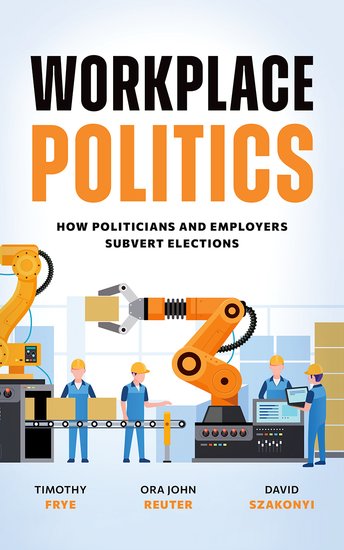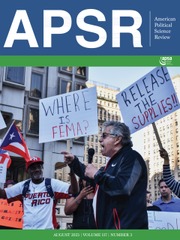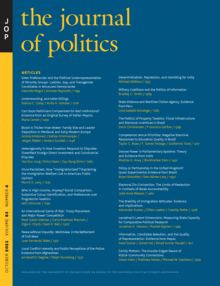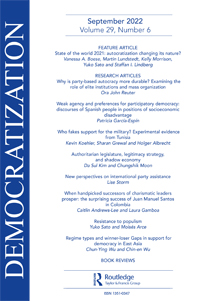
Home
I am a Professor in the Department of Political Science at the University of Wisconsin–Milwaukee. My research is in the areas of comparative political institutions, authoritarianism, elections, democratization, comparative political economy, and Russian politics. Navigate the links above to learn more about my research and teaching.
Recent Publications

Workplace Politics: How Politicians and Employers Subvert Elections. (with Timothy Frye and David Szakonyi) New Book from Oxford University Press
In many countries politicians rely on employers to influence the voting behavior of their employees, but this type of voter mobilization has received very little attention. Workplace Politics draws on unique surveys of firm managers and employees in eight countries, as well as a wealth of fine-grained observational data and qualitative interviews from Russia, to demonstrate that workplace mobilization is common, often coercive, and unpopular with many voters. It argues that when firm managers depend on the state, cannot easily move their assets, or can easily replace workers, politicians can induce employers to get their workers to the polls.

“Endogenous Popularity: How Perceptions of Support Affect the Popularity of Authoritarian Regimes” (with Noah Buckley, Kyle Marquardt, and Katerina Tertychnaya) Recent Research in American Political Science Review.
We study whether the perception of an autocrat's popularity can affect actual support for an authoritarian leader. Using a novel combination of framing and list experiments, our results suggest that Russians become genuinely less supportive of Putin when presented with information that suggests he is unpopular.

“Civic Duty and Voting under Autocracy” Recent Article in Journal of Politics.
This article explores the duty to vote under electoral autocracy. Using original survey data from Russia, I present evidence that most voters feel an ethical obligation—a civic duty—to vote. Because autocratic regimes often penetrate and politicize the state, I argue that opposition voters are less likely to revere the state and less likely than regime supporters to believe that voting is a civic duty. The theory and findings suggest that authoritarian incumbents have an inherent mobilizational advantage: their supporters feel a duty to vote, but regime opponents do not.

“Why is party-based autocracy more durable? Examining the role of elite institutions and mass organization.” Recent Article in Democratization. (Winner of Frank Cass Award for Best Article published in Democratization in 2022)
A number of studies show that autocracies with ruling parties are more long-lived than those without. Much of the literature attributes this to party institutionalization at the elite- level, which is said to reduce elite schisms. Others point to the ability of grassroots party organizations to mobilize mass support. There is very little empirical research that examines these different mechanisms. This paper fills that gap using new data from the V-Party database, which provides detailed expert-coded information on the attributes of all autocratic ruling par- ties between 1970 and 2019.